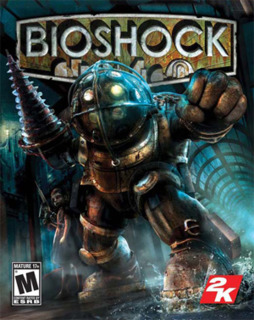It could've been great if it had been more true to SS2, but I think that Irrational just missed the mark on this one.
I'll start with the good things. First off, the graphics are very pretty, especially if you've got a machine that can really run it well (play it on widescreen if you can). The character models are good, the blood effects-though probably a bit much at times-are solid, and the weapons are particularly well-drawn. The water effects are excellent and highly convincing, as are reflections and shadows. The lighting is superb, and used to great effect.
As with System Shock 2, the sound in BioShock is excellent. Weapon sounds are very convincing, footsteps are very good, and the dripping-water effects are spooky. I particularly liked the clicking noises that the turrets make, as well as the thundering footsteps of the Big Daddies.
The atmosphere of BioShock is outstanding, and is-in my opinion-the one aspect of the game in which Ken Levine and his team really did justice to System Shock 2. As mentioned before, lighting and sound effects do a great job of contributing to the game's creepy atmosphere. In addition, the 1940's setting is extremely effective overall. The posters on the walls are great, and the PA announcements are every bit as effective as those of Xerxes in SS2. The in-game music coming through phonographs placed throughout Rapture was by far my favorite part of the environment.
As far as gameplay, Irrational did some very interesting things in BioShock. The whole "plasmid" concept works surprisingly well, and some of them are a lot of fun to play with. I'm still not quite sure how I feel about character customization in the game; while there are plenty of abilities to choose from, the stats system from System Shock 2 was removed completely. This makes it a little easier to know what to do, but also limits the player's ability to really customize the character.
For all the things I liked about Bioshock, there were plenty of things on which I was not as keen. First off, the story was not nearly as effective as that of System Shock 2 (Potential SPOILER ALERT ahead). I was rather disappointed to find that the overall story arc was almost identical to System Shock 2's. At the beginning of the game, the player is rescued from a desperate situation by someone in a remote location communicating via radio, who guides the player through the game and eventually turns out to be the main villain who has to be destroyed in the final battle. That sounds awfully familiar. I don't think it's too much to ask the writers to come up with some original material (END OF SPOILER ALERT). The audio recordings were a BIG stretch. I understand the concept of suspending disbelief, but I just couldn't buy the idea that these people took big, clunky tape players everywhere they went to record their thoughts. This worked very well in System Shock 2, as all the crew members simply recorded diary entries on their PDA's; it worked in a few instances in BioShock as well, such as the recordings of the scientific experiments. I would have been much happier with simple written diary entries, and maybe ghostly voices reading them aloud if Irrational really wanted to have them vocalized. Furthermore, with the exception of Andrew Ryan and Sander Cohen, none of the characters really seemed to breathe the way the crew of the Von Braun did. And although there were some disturbing things, such as the little sisters and the genetic modifications, most of the scares came in the form of cheap surprises such as people jumping out from behind desks.
I had serious problems with the gameplay of BioShock. The FPS aspect was taken way too far, as it was commonplace to have to run into a room guns blazing and take out twenty splicers at a time. The game as a whole felt highly scripted from beginning to end, as most of the progression in the game came in the form of the player entering a room and going through the other side, and repeating this process until a dead end was reached, at which point there would be a radio message followed by a hundred baddies coming through the door. And, in classic shooter style, there was a boss fight at the end of every level, which really felt entirely unnecessary. Besides all this, in stark contrast to System Shock 2, the game was TOO EASY. Every time the player dies, no matter what, he is simply respawned, the only negative repercussion being that he has to walk back to where he died. There's no loss of money or anything of the sort, and it is actually 100% impossible to lose the game until the final level. In addition, the game was far too short, taking maybe ten to twelve hours to complete, and replay value is very limited.
In retrospect, I wasn't sure that BioShock was worth the fifty bucks I paid for it on launch day. It was fun, but I'm just not sure that it really lived up to all the hype. My hope is that the game's popularity will allow Ken Levine to get it right the second time around in BioShock 2, while still making the game a financial success. We'll see.

